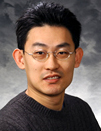"Topological and Sparse Brain Network Modeling"
Date

Moo K. Chung, PhD
Associate Professor, Department of Statistics, Biostatistics and Medical
Informatics, University of Wisconsin-Madison. Also affiliated with the Waisman
Laboratory for Brain Imaging and Behavior and Waisman Vocal Tract Laboratory.
Abstract: Diffusion tensor imaging (DTI) regularly produces extremely dense networks with up to a half million white matter fiber tracts per brain, which correspond to a half million edges and one million nodes of a network. The resulting network defies standard modeling techniques due to the sheer computational load. For instance, the correlation matrix corresponding to such data contains 100 billion entries. Researchers have been trying to reduce the complexity of networks for meaningful biological interpretation. For small networks with less than 200 nodes, compressed sensing or sparse regression type of techniques are mainly used in sparsifying the number of edges. However, applying these types of optimization based sparse models to such massive data is not even feasible without serious computing recourses. To address the problem, we propose a novel computational framework called persistent homology.Unlike many data reduction techniques, persistent homology actually increases the dimension of the data by the additional parameter and exploits the hidden but persistent topological structures and completely bypass the computational bottleneck. The proposed method has been applied in characterizing various clinical populations that include autistic, attention deficit hyperactivity disorder and maltreated children.
Bio: Moo K. Chung, Ph.D. is an Associate Professor in the Department of Statistics, Biostatistics and Medical Informatics at the University of Wisconsin-Madison. He is also affiliated with the Waisman Laboratory for Brain Imaging and Behavior. Dr. Chung received Ph.D. in Statistics (NeuroImaging) from McGill University under Keith J. Worsley and James O. Ramsay in 2001. Dr. Chung’s main research area is computational neuroanatomy, where noninvasive brain imaging modalities such as magnetic resonance imaging (MRI) and diffusion tensor imaging (DTI) are used to map the spatiotemporal dynamics of the human brain. His research concentrates on the methodological development required for quantifying and contrasting anatomical shape variations in both normal and clinical populations at the macroscopic level using various mathematical and computational techniques. Recently, Dr. Chung won Vilas Associate Award for years 2013-2014 for his applied topological research to brain imaging and the Editor's Award for best paper published in Journal of Speech, Language, and Hearing Research in 2011 for the paper that analyzed vocal tract CT images. Dr. Chung has published a book titled Computational Neuroanatomy: The Methods in 2012 that summarizes his research for last ten years.
Please note that Dr. Moo Chung is an applicant for the Engineer/Mathematician Faculty Position.
Type
Time Duration
Location

Moo K. Chung, PhD
Associate Professor, Department of Statistics, Biostatistics and Medical
Informatics, University of Wisconsin-Madison. Also affiliated with the Waisman
Laboratory for Brain Imaging and Behavior and Waisman Vocal Tract Laboratory.
Abstract: Diffusion tensor imaging (DTI) regularly produces extremely dense networks with up to a half million white matter fiber tracts per brain, which correspond to a half million edges and one million nodes of a network. The resulting network defies standard modeling techniques due to the sheer computational load. For instance, the correlation matrix corresponding to such data contains 100 billion entries. Researchers have been trying to reduce the complexity of networks for meaningful biological interpretation. For small networks with less than 200 nodes, compressed sensing or sparse regression type of techniques are mainly used in sparsifying the number of edges. However, applying these types of optimization based sparse models to such massive data is not even feasible without serious computing recourses. To address the problem, we propose a novel computational framework called persistent homology.Unlike many data reduction techniques, persistent homology actually increases the dimension of the data by the additional parameter and exploits the hidden but persistent topological structures and completely bypass the computational bottleneck. The proposed method has been applied in characterizing various clinical populations that include autistic, attention deficit hyperactivity disorder and maltreated children.
Bio: Moo K. Chung, Ph.D. is an Associate Professor in the Department of Statistics, Biostatistics and Medical Informatics at the University of Wisconsin-Madison. He is also affiliated with the Waisman Laboratory for Brain Imaging and Behavior. Dr. Chung received Ph.D. in Statistics (NeuroImaging) from McGill University under Keith J. Worsley and James O. Ramsay in 2001. Dr. Chung’s main research area is computational neuroanatomy, where noninvasive brain imaging modalities such as magnetic resonance imaging (MRI) and diffusion tensor imaging (DTI) are used to map the spatiotemporal dynamics of the human brain. His research concentrates on the methodological development required for quantifying and contrasting anatomical shape variations in both normal and clinical populations at the macroscopic level using various mathematical and computational techniques. Recently, Dr. Chung won Vilas Associate Award for years 2013-2014 for his applied topological research to brain imaging and the Editor's Award for best paper published in Journal of Speech, Language, and Hearing Research in 2011 for the paper that analyzed vocal tract CT images. Dr. Chung has published a book titled Computational Neuroanatomy: The Methods in 2012 that summarizes his research for last ten years.
Please note that Dr. Moo Chung is an applicant for the Engineer/Mathematician Faculty Position.
